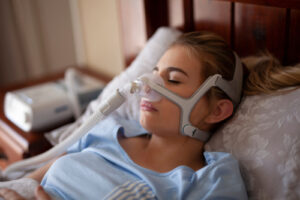A prevalent sleep problem that affects millions of people worldwide is sleep apnea. It happens when someone’s breathing is continuously disturbed while sleeping, causing them to wake up and gasp for air briefly. Sleep apnea can cause major health issues, such as high blood pressure, heart disease, stroke, and diabetes if it is not treated. This post will look at the causes, signs, and potential sleep apnea treatments.
What Causes Sleep Apnea?
Obstructive and central sleep apnea are the two basic kinds of conditions. The most prevalent type of sleep apnea, obstructive sleep apnea (OSA), happens when the airway becomes obstructed while you’re asleep, typically because your throat muscles relax. When the brain fails to tell the breathing muscles to contract during sleep, central sleep apnea (CSA) results, causing breathing to stop and start. 
Obesity, smoking, drinking alcohol, having a family history, and having some medical issues, including high blood pressure and diabetes, can all raise the chance of developing sleep apnea. In addition, with persons over 40, men are more prone than women to acquire sleep apnea. Go and see your dentist at https://trident.dental/north-charleston/ to get checked out.
Symptoms of Sleep Apnea
Loud snoring, gasping for oxygen as you sleep, and waking up with a dry mouth or sore throat are typical signs of sleep apnea. Additional signs and symptoms could include headaches in the morning, midday exhaustion, trouble focusing, irritability, and sadness. In some situations, bedwetting, a decline in libido drive, and memory issues can also result from sleep apnea.
Discussing your worries with your doctor if you encounter any of these symptoms is crucial. They suggest that you seek a sleep specialist who can perform a sleep study to determine the nature of your condition and suggest the best course of action.
Treatment Options for Sleep Apnea
There are several treatment options for those with sleep apnea, including CPAP treatments, lifestyle modifications, and surgical procedures.
- Lifestyle Modifications – In moderate cases of sleep apnea, changing some aspects of one’s lifestyle can help reduce the condition’s symptoms. To enhance sleep quality and lessen the severity of sleep apnea symptoms, one can lose weight, stop smoking, drink less alcohol, and create a regular sleep pattern.
- CPAP Therapy – CPAP therapy is the most common treatment for sleep apnea and involves wearing a mask that delivers pressurized air to keep the airway open during sleep. While it can take some time to get used to wearing the show, most people find that it significantly improves their sleep quality and reduces sleep apnea symptoms.
- Surgery – In some circumstances, surgery may be suggested to cure sleep apnea. The removal of extra tissue from the throat or nasal passages, the adjustment of anatomical issues, or the implantation of a device to support maintaining the airway open while you sleep are a few examples.
Conclusion
A major sleep disorder called sleep apnea can negatively influence your health and quality of life. Thankfully, there are effective management strategies for sleep apnea symptoms that can also enhance the quality of your sleep. First, discuss your worries and the potential treatments with your doctor if you think you could suffer from sleep apnea. Then, you can take charge of your sleep with the correct care, leading a healthier, happier life.